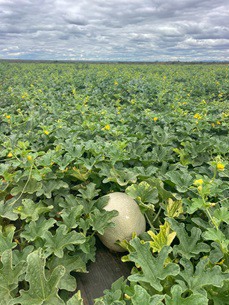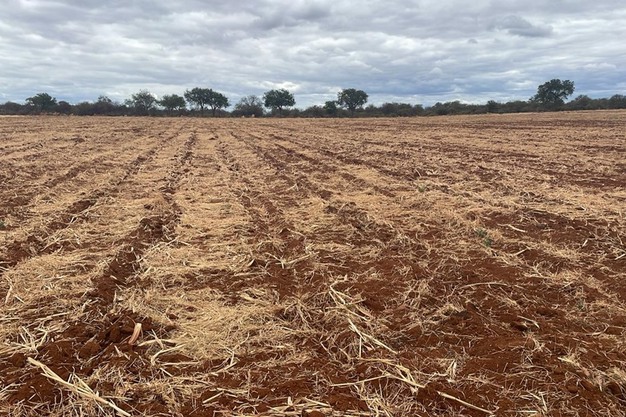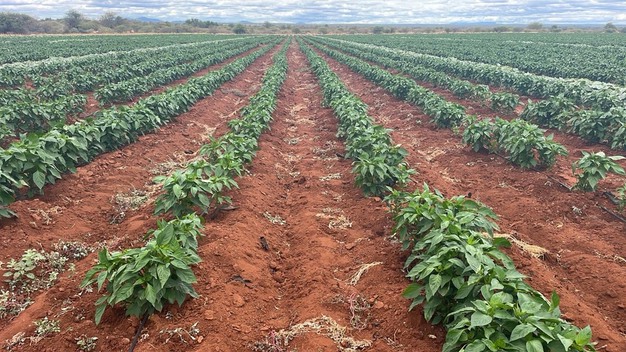 Farms are having to draw deeply on all available resources as the government plans phasing out a significant number of agrochemicals by June 2024. Janlouis Boerdery embarked on the process to wean themselves off a complete reliance on agrochemicals seven years ago.
Farms are having to draw deeply on all available resources as the government plans phasing out a significant number of agrochemicals by June 2024. Janlouis Boerdery embarked on the process to wean themselves off a complete reliance on agrochemicals seven years ago.
Right: melons ripening on the vine
"Not that we had much of a choice," remarks Tinus Venter, who grows vegetables and fruit in partnership with his brothers on the banks of the Mokgalakwena River in South Africa's far north. As is usual around here, they also keep livestock and wild game. "Seven years ago our yields were just not what we used to get before. It was clear something was wrong."
It takes time to restore the soil structure after years of 'cleaning' the soil profile. "You end up killing off the good guys in the process. That's how diseases become more frequent and severe and you need to apply more chemicals and then you're just going backwards."
A friend's advice that this was a long-distance race, helped them to persevere through initial scepticism.
"Don't expect results within a year. By year three you'll start seeing results, and from the fourth year every year is better. Today we're really pleased we made the changes. For the last three or four seasons our yields are on an upward curve. It's been very satisfying."
Best results with a chemical-biological combination
Venter says that in their experience, a combination of chemicals and biologicals yields the best results. They tried going solely biological in some of their pepper net houses, but found that when pest pressure exceeded a certain level, it overwhelmed them.
And in their tomato blocks there is currently no alternative to weekly sprayings against the Tuta absoluta moth, a fairly new and very impactful pest on South African tomatoes.
Sunburn causes significant damage to peppers at the moment
The moment you notice a pest among your plants, he observes, the crop is already stressed. "Then you have to turn to the heavier cannons, harder and more expensive poisons to sort out the problem. Therefore, we spray proactively and frequently with softer, less expensive chemicals. Normally we don't get big problems although whitefly has been rough since December and, of course, always thrips."
For the past five years they have completely stopped applying poisons to their soil as they have learned that most nematodes are, in fact, beneficial predators feeding on the fungi causing gummy stem and root rot.
Playing the long game on the same fields
The importance of crop rotation has long been known: lands with peppers this year get melons or butternuts next year, followed by a grass crop like corn (maize). Four years ago they introduced a strain of sorghum (an indigenous African grain) called 'cow candy' into their rotation.

'Cow candy' sorghum worked into the soil with a one tooth ripper before melons are planted
"You can't keep on opening up new lands, your farm is only so big and besides, large parts of our farm are very stony. Anyway, you don't want to remove all of your trees and bush. To farm sustainably on the same lands on one farm there's no way around bringing in biological components like compost and green crops."
Roughly a quarter of the grasses they plant are grazed, the other threequarters are left to reach two metres, and worked into the soil just before seeds form.
They've made the decision to remove their lemon orchards, originally planted for exports but the problems at the harbour, a lemon oversupply and the crashing of the lemon juice price meant they never got to that point.
The upside of that decision is that it brings in more space for cash crops like melons or butternuts while other fields under intensive cultivation get a chance to rest, covered by a green crop.
Ploughing belongs to the past
A visit to the United States a few years ago was an eye-opener: to see how farmers with access to the most advanced technology, have chosen to stop tilling the soil which disrupts the living systems below.
Now they never plough up their soil at all, saving a tremendous amount of money on fuel and labour. Over recent weeks temperatures have been in the mid-forties Celsius every day and all soil life wither in an exposed, upturned soil.
Their entire pre-planting preparation consists of organic fertilization and compost.
"Then we plant and we rear the plant with chemical fertigation through our drip systems. Minimal soil cultivation has made a very big difference on our farm. Soil health is without a doubt in a much better condition than a few years ago and I can see the difference it's made to our quality and our yields."

He has observed greater insect life and even earthworms at certain times of the year. "Ten years ago, when we were still fumigating the soil, you wouldn't be seeing even one earthworm in our fields."
These days the margins on a farm are so slim, he observes, "your mathematics have to be faultless."
For more information:
Tinus Venter
Janlouis Boerdery
Email: [email protected]
